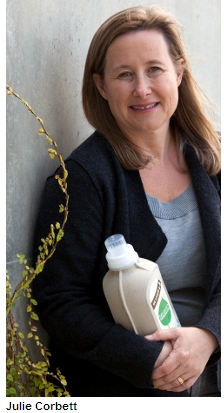
Julie Corbett, founder/CEO of Ecologic Brands, created a stir when she introduced the eco.bottle in 2008. Made of a molded-fiber outer shell with an inner pouch, the package scores multiple sustainability wins: source reduction, recycled content, recyclability, compostability and optimal shipping. Her lack of previous packaging experience actually gave her an innovation edge, as she relates here.
Q: What were some of the advantages and disadvantages of launching a packaging company without a background in packaging?
A: Launching a packaging company as an outsider looking in worked out to be an advantage because it enabled innovation and thinking without existing limitations. I could stir the pot and brainstorm with a white space. Most innovation in the packaging world happens around advancements in existing infrastructure (top down), whereas I had the opportunity to think more from the consumer's perspective (bottom up)—in other words, backwards from the end of the supply chain.
Packaging is a mature and traditional industry. As a first-time entrepreneur, it forced me to quickly gain a solid handle on industry and technical packaging knowledge. I continue to be excited by the challenge of successfully executing my idea and innovating among other large packaging players.
Q: How has your perception of the industry changed over the last four years?
A: The industry plays an even more important role in society than what I originally thought. Packaging is the key vehicle that bridges brands with consumers and gives them access to engage with the product. It is not just about design and aesthetics, because packaging also serves a protective role that is not appreciated by the consumer.
I have a lot of respect for packaging companies. We operate at the crossroads between product and people, and the package we deliver will have significant, measurable implications beyond just the container itself. If the package fails, recyclable or not, there's a tremendous amount of waste and spoilage, including what was filled inside.
Q: What have been your most important learnings along the way?
A: Innovation is extremely complex. A light bulb goes off when you come up with a great idea but sleepless nights come with keeping that light illuminated. From the moment we made the first paper bottle prototype, we continued to perfect other variations to outperform plastic. Two years later, we've finally commercialized the eco.bottle thanks to the support of our partners. We are quickly transforming from a disruptive innovator into a sizable, sustainable packaging manufacturer. To accomplish continuous success and become an industry game changer with staying power, we've learned to be adaptable and never stop pushing.
It is not just about Ecologic Brands, though. It's about building bridges and partnerships, and bringing believers closer while tuning out the naysayers. We are humbled to be surrounded by trusting, passionate industry peers who challenge our thinking while continuing to support our development. I learned that external teamwork is critical to building knowledge and traction, especially in the packaging industry.
Q: Where do you think the greatest opportunity for our industry lies and why?
A: The packaging industry is in a transition phase, and I believe this is the best thing that could happen to our industry. Society is paying more attention to packaging now and scrutinizing the industry as the main culprit for generating solid waste. This attention creates tremendous opportunity with the shift towards packaging that is truly eco-friendly. Whenever there is a spotlight, people and talent will follow. Historically, that has translated to more innovation and accelerated economic activity. This transition will breathe new life into our industry.
I founded Ecologic Brands believing there is tremendous opportunity for more sustainability in the packaging industry, and still believe that today. I always carry an Ecologic paper bottle with me and continue to get approached by strangers with questions. I imagine other innovative packaging would get the same positive reaction from people. Solid waste from packaging is a well-understood and tangible problem around the world. People get it, brands get it and packaging companies have the unique position to lead change.
Q: What's next, particularly when it comes to sustainability, and how do we get there?
A: Life-cycle analysis (LCA) is becoming the standard tool for all companies to validate their sustainability attributes, if any. LCAs measure the use of energy, materials and releases to the air, water and earth by a product from raw material extraction through end-of-life management. This type of measurement tool is here to stay. Consumers are inquisitive and resourceful these days, and they will question whether a company's "green claims" are true or not. CPGs, on the other hand, are also starting to ask packaging companies about LCAs.
Looking at a business through a holistic and data-driven approach will enable companies to further strengthen their product development and manufacturing strategies, to always consider key steps present throughout the packaging supply chain journey instead of just one part of any business: raw material extraction; processing/fabrication; wholesale and retail; product use; and end-of-life management.





